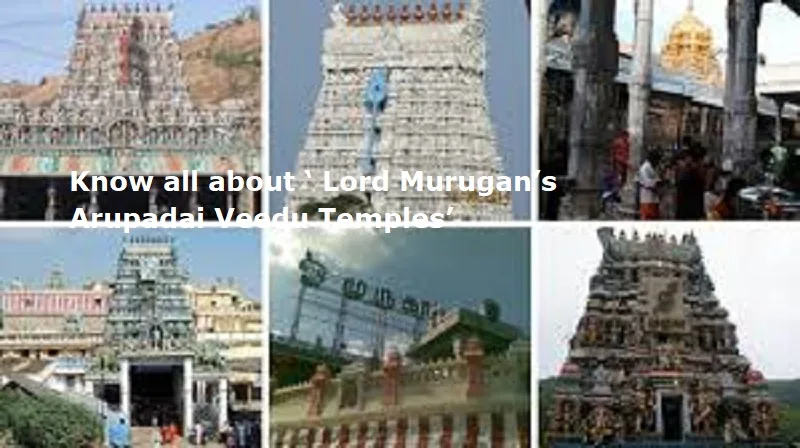
Mumbai: Lord Murugan is the son of the Hindu God of Destruction, Lord Shiva and the brother of the remover of obstacles, Lord Ganesh (The elephant-headed God). Lord Murugan has two wives – Valli and Devasena. Murugan is often referred to as “The god of the Tamils” and is worshiped primarily in areas with Tamil influences, especially South India, Sri Lanka, Mauritius, Indonesia, Malaysia and Singapore.
Murugan rides a peacock and wields a bow in battle. The ardent devotees of Murugan call him by a variety of names – Karthilkeya, Arumuga, Shanmuga, Guhan, Skanda and Lord Subramanya. During His bachelorhood, Lord Murugan is also regarded as Kumaraswami (Bachelor God), ‘Kumara’ meaning a bachelor and ‘Swami’ meaning God.
His six most important shrines in India are the ‘Six Abodes of Murugan’, which are temples located in Tamil Nadu, also known as Arupadai Veedu Murugan temples.
1.Palani Murugan Temple
Located in Dindigul District, on the Palani hill bottom called ‘Thiruaavinankudi’, where the deity is known as ‘Kuzhanthai Velayuthaswami’ and was worshipped by Goddess Lakshmi (‘Thiru’ in Tamil), the sacred cow Kamadhenu (‘Aa’ in Tamil), the sun god Surya (‘Inan’ in both Tamil & Sanskrit), the earth goddess (‘ku’ in Tamil), and the fire god Agni (‘Di’ in Tamil), and has idols of all of them.
There is also a Murugan temple on the Palani hill top where ‘Dhandayuthapani’ is the main deity, in a meditating state, carrying a staff (‘danda’) as weapon (‘ayutha’) in his hands (‘pani’). This is the place where Murugan resided after his feud with his family over a divine fruit. Here, the main deity is made out of an amalgam of nine minerals popularly called Navabashanam and was established by Saint Bhogar.
2.Swamimalai Murugan Temple
Located at 5 km from Kumbakonam, the temple is built on an artificial hill. The temple commemorates the incident where Muruga explained the essence of the pranava mantra “Om” to his father Shiva.
The shrine of the presiding deity, Swaminathaswamy is located atop a 60 ft (18 m) hillock and the shrine of his mother Meenakshi (Parvathi) and father Shiva (Sundareswarar) is located downhill. The temple has three gopuram (gateway towers), three precincts and sixty steps and each one is named after the sixty Tamil years.
3.Thiruchendur Murugan Temple
Located on the sea-shore near Tuticorin amongst the remains of Gandhamadana Parvatam or Santhanamalai (Sandal Mountain). The temple commemorates the place where Murugan won a decisive victory over demon Soorapadman by worshipping Lord Shiva.is the only one among the six sacred temple complexes to be situated near the sea shore.
This temple is the fourth Hindu temple in Tamil Nadu to get ISO certification. It is located in the eastern end of the town Thiruchendur in the district of Tuticorin, Tamil Nadu, India.The temple complex is on the shores of Bay of Bengal.
Also Read: Chant these Lord Murugan mantras for success
4.Thirupparamkunram Murugan Temple
Tirupparankunram Murugan Temple is a Hindu temple and one of the Six Abodes of Murugan, located at Tirupparankunram, 8 kilometres from Madurai. This is the first of the Arupadaiveedu.
The temple is built in rock-cut architecture and believed to have been built by the Pandyas during the 6th century. According to the legend it is where Murugan slayed the demon Surapadman and married Deivayanai, the daughter of the king of heaven, Indra, and he is said to have worshipped Shiva here as Parangirinathar.
5.Thiruthani Murugan Temple
Thiruthani Murugan temple is a Hindu temple, on the hill of Thiruttani, Tamil Nadu, India, dedicated to Lord Muruga. The hill has 365 steps indicating 365 days of the year. It is one of the Arupadaiveedu, the six holy abodes of Lord Muruga.
This temple has been mentioned in the Sangam period work Tirumurugaatruppadai composed by Nakkeerar. It has been patronized by the Vijayanagar rulers and local chieftains and zamindars.
6.Pazhamudircholai Murugan Temple
Pazhamudircholai Murugan Temple is a Hindu temple, located about 25 kilometres north of Madurai, India atop a hill covered with dense forests. One of the six important abodes (Arupadaiveedu) of Lord Muruga, it is close to the Vishnu temple of Azhagar Kovil. It is said that the Azhagar Kovil was the actual temple for the main deity of the temple, and the deity was later shifted or relocated to Pazhamudircholai during Thirumalai Nayak‘s rule in Madurai.
It is a dense forest where Valli is supposed to have lived. The temple itself is relatively small with Valli, Deivayanai, and Lord Muruga in a separate shrine. Lord Ganesha is also present in a separate shrine.
Among the Arupadaiveedu, Pazhamudircholai is the last. Lord Muruga at Pazhamudircholai is praised in several works of old Tamil literature such as the Silappathikaram, the Ettuthokai and the Pattupattu.

Post Your Comments